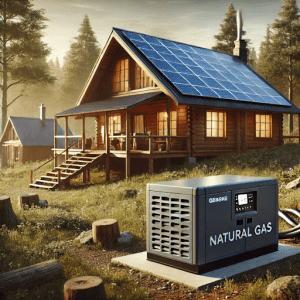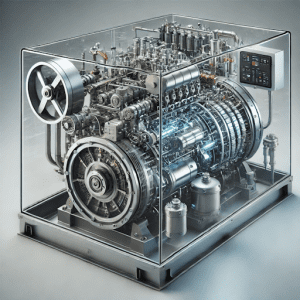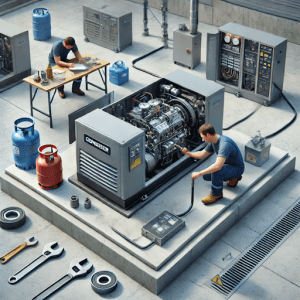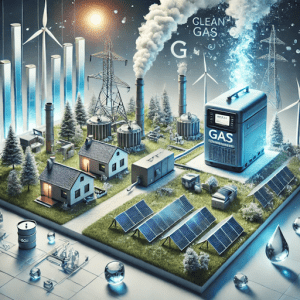Unlock the Benefits of Natural Gas Generators for Sustainable Off-Grid Power
For anyone seeking a reliable and efficient power source for homes or cabins in remote locations, natural gas generators stand out as an exceptional choice. Understanding the various power generation methods is crucial as you embark on your off-grid journey. The distinct advantages of natural gas generators, including their remarkable reliability, cost-effectiveness, and eco-friendly attributes, make them a highly attractive option for off-grid living enthusiasts committed to sustainability and operational efficiency. By leveraging these generators, you can ensure a steady energy supply while minimizing your environmental impact.
As technology continues to advance, the concept of off-grid living has captured the attention of countless individuals. Whether motivated by a commitment to sustainable practices, a longing for independence, or the dream of a self-sufficient lifestyle, disconnecting from the traditional power grid can be incredibly rewarding. Off-grid power solutions allow you to tap into renewable resources or alternative fuels, creating a comfortable living environment free from reliance on conventional electricity sources.
Equipping yourself with the right knowledge and preparation enables you to seamlessly integrate a natural gas generator into your off-grid lifestyle, ensuring that your essential needs are met with consistent power. This article will explore the numerous advantages of natural gas generators, elucidate their operation, and outline critical considerations for selecting and installing them in your off-grid setup.
 Enhance Your Off-Grid Experience with Essential Insights on Natural Gas Generators
Enhance Your Off-Grid Experience with Essential Insights on Natural Gas Generators
- Off-grid power solutions provide freedom from traditional energy sources, making them essential for remote living and unexpected power outages.
- Natural gas generators produce reliable and efficient energy, emitting significantly lower pollutants compared to diesel or gasoline alternatives.
- These generators operate by combusting natural gas to create mechanical energy, which is converted into electrical energy through a generator system.
- When selecting a natural gas generator, evaluate crucial factors such as power output, fuel efficiency, and maintenance needs to ensure optimal performance.
- Proper setup and ongoing maintenance are vital for the safe and efficient functioning of your natural gas generator.
Explore the Remarkable Advantages of Natural Gas Generators for Your Energy Needs
One of the most significant advantages of natural gas generators is their exceptional reliability. By choosing a natural gas generator for your off-grid energy requirements, you can count on a steady power supply tailored to your specific needs. Unlike solar panels or wind turbines, which can be adversely affected by changing weather conditions, natural gas generators deliver a stable energy output that remains unaffected by external variables.
This reliability is particularly vital for those who depend on electricity for essential functions, such as heating, refrigeration, or the operation of medical devices. Knowing that your generator can provide power when you need it most offers invaluable peace of mind. In addition to their dependability, natural gas generators also present notable cost savings.
While the initial investment may be higher than some other off-grid alternatives, the long-term savings can be substantial. Natural gas is often less expensive than gasoline or diesel, leading to lower operational costs over time. Moreover, the maintenance requirements for natural gas generators are generally less stringent than those of other fuel types, allowing you to conserve both time and resources while enjoying a consistent and reliable energy supply.
 Gain Insight into the Operational Mechanics of Natural Gas Generators
Gain Insight into the Operational Mechanics of Natural Gas Generators
Natural gas generators operate by transforming the chemical energy found in natural gas into electrical energy through a combustion process. When the generator is started, natural gas is mixed with air and ignited within the engine's combustion chamber. This ignition creates high-pressure gases that drive the engine's pistons, ultimately rotating the generator's rotor and producing electricity.
This operational method is particularly noteworthy for its efficiency, as it emits fewer pollutants compared to other fossil fuel options. A critical component of a natural gas generator is its fuel system, which usually includes a regulator to control gas flow and ensure peak performance. Many modern natural gas generators come equipped with advanced features, such as automatic start/stop functions and remote monitoring capabilities.
These technological enhancements significantly improve user convenience, enabling you to manage your power supply more effectively and streamline your off-grid lifestyle.
Essential Considerations for Choosing the Right Natural Gas Generator
| Consideration | Description |
|---|---|
| Power Output | Calculate the generator’s required power output based on the specific appliances and equipment you plan to operate. |
| Fuel Type | Choose natural gas as your fuel option for its clean-burning and cost-effective qualities. |
| Size and Portability | Select a generator size and portability that fit your available space and mobility needs. |
| Noise Level | Assess the generator’s noise output to ensure it meets acceptable standards for your living environment. |
| Start-up Mechanism | Choose between manual or automatic start-up options based on your convenience and frequency of use. |
When selecting a natural gas generator for your off-grid system, it’s essential to evaluate several key factors. First, determine your power needs by calculating the total wattage required to support your critical appliances and devices, ensuring that your chosen generator can handle the load.
It is wise to select a generator with a slightly higher capacity than your calculated requirements to accommodate any sudden spikes in power demand. Another crucial factor is the generator’s portability and installation considerations. If you intend to move your generator frequently or utilize it in various locations, opt for a lightweight, easily transportable model.
Moreover, consider whether you prefer a stationary setup or a portable unit that can be conveniently adjusted according to your needs. Lastly, pay close attention to the generator’s noise level; quieter models can enhance your off-grid experience by minimizing disruptions and preserving the serenity of your natural surroundings.
 Essential Best Practices for Installing and Maintaining Natural Gas Generators
Essential Best Practices for Installing and Maintaining Natural Gas Generators
The installation process for a natural gas generator requires careful planning and execution to ensure both safety and efficiency. Begin by choosing an appropriate location for your generator, ensuring compliance with local regulations and safety standards. This location should ideally be well-ventilated and adequately distanced from flammable materials to minimize risks.
You may also need to create a concrete pad or platform to stabilize and protect the generator from moisture-related damage. Once the optimal location is established, connect the generator to your natural gas supply line. If you lack experience with gas line installations, it is advisable to seek professional assistance to ensure adherence to all safety protocols.
After establishing the fuel connection, set up the necessary electrical connections to integrate the generator with your home’s electrical system. Regular maintenance is essential for keeping your generator operating smoothly. This involves routine inspections of oil levels, air filter replacements, and spark plug checks to maintain peak performance.
Comprehensive Cost Analysis: Natural Gas Generators vs. Other Off-Grid Power Options
When evaluating the costs linked to off-grid energy solutions, it is vital to perform a thorough comparison between natural gas generators and alternative options, such as solar panels and diesel generators. While solar energy systems are celebrated for their renewable nature, they often require a significant initial investment in panels, batteries, and inverters. Additionally, solar systems may struggle to deliver sufficient power during overcast conditions or at night without adequate battery storage.
Conversely, while diesel generators are known for their reliability, they typically incur higher fuel costs and require more frequent maintenance compared to natural gas generators. Given that diesel fuel prices can vary considerably, natural gas often provides a more stable and frequently lower-cost option in many regions. A long-term cost analysis suggests that natural gas generators generally offer a more economical solution for those pursuing off-grid living.
 Evaluate the Environmental Impact of Natural Gas Generators in Off-Grid Living
Evaluate the Environmental Impact of Natural Gas Generators in Off-Grid Living
As you explore various off-grid energy alternatives, it is crucial to assess their environmental impact. Natural gas is often recognized as a cleaner alternative to other fossil fuels, such as coal or oil, due to its lower carbon emissions during combustion. By opting for a natural gas generator, you can significantly shrink your carbon footprint while ensuring a reliable power supply for your off-grid lifestyle.
However, it’s important to acknowledge that natural gas is still a fossil fuel, and its extraction can lead to environmental challenges. Methane leaks during extraction and transportation processes pose significant concerns regarding greenhouse gas emissions. To mitigate these issues, prioritize sourcing natural gas from reputable suppliers dedicated to sustainable practices.
In addition, integrating renewable energy sources alongside your natural gas generator can further demonstrate your commitment to environmental sustainability and responsible energy consumption.
Inspiring Real-Life Examples of Successful Off-Grid Living with Natural Gas Generators
Examining real-world examples provides valuable insights into how natural gas generators have been effectively utilized in various off-grid living scenarios. Many rural homeowners have successfully transitioned to natural gas generators as their primary energy source after experiencing frequent outages from traditional utility services. The adoption of these generators has empowered them to achieve energy independence while ensuring a reliable electricity supply for heating, cooling, and essential household appliances.
Additionally, many remote cabins depend on natural gas generators for seasonal use. Due to their isolated locations, these cabins often lack access to conventional power sources. Natural gas generators enable cabin owners to enjoy modern amenities such as refrigeration and lighting without compromising their connection to the natural environment.
These success stories illustrate how natural gas generators can effectively support off-grid living, offering both comfort and reliability. As you embark on your journey towards off-grid living, consider the extensive benefits that natural gas generators provide. From their reliability and cost-effectiveness to their relatively low environmental impact, these generators can play a crucial role in achieving energy independence.
By carefully selecting the right model for your requirements and following proper installation and maintenance guidelines, you can transition smoothly into an off-grid lifestyle powered by natural gas.
Answering Common Questions About Natural Gas Generators
What defines a natural gas generator suitable for off-grid applications?
A natural gas generator designed specifically for off-grid living is a power generation system that utilizes natural gas as its fuel source to produce electricity in remote areas where access to the main power grid is limited or unavailable.
How does a natural gas generator operate in off-grid settings?
A natural gas generator intended for off-grid applications works by combusting natural gas within an internal combustion engine. This combustion process produces mechanical energy, which is then converted into electrical energy through a generator. The electricity generated can power various appliances, equipment, and lighting in off-grid environments.
What are the main advantages of utilizing a natural gas generator for off-grid living?
Key benefits of using a natural gas generator for off-grid living include:
– Reduced fuel costs compared to diesel or gasoline generators
– Cleaner combustion resulting in lower emissions
– Continuous fuel supply sourced from natural gas pipelines
– Lower maintenance needs compared to other fuel options
What factors should be taken into account when using a natural gas generator for off-grid living?
Important considerations when utilizing a natural gas generator in off-grid scenarios include:
– Availability of a natural gas supply in your area
– Initial installation and equipment costs
– Regular maintenance and servicing requirements
– Environmental implications and adherence to emissions regulations
Can natural gas generators for off-grid applications be used for both residential and commercial purposes?
Natural gas generators designed for off-grid use are suitable for both residential and commercial applications. They are commonly used in remote homes, cabins, farms, and small businesses lacking access to the main power grid.
The post Natural Gas Generators for Off-Grid Power Solutions appeared first on Survival Bite.
The Article Natural Gas Generators: Your Off-Grid Power Solution Was Found On https://limitsofstrategy.com
The Article Natural Gas Generators as Your Off-Grid Power Source First Appeared ON
: https://ad4sc.com

 Gain Insight into the Operational Mechanics of Natural Gas Generators
Gain Insight into the Operational Mechanics of Natural Gas Generators Essential Best Practices for Installing and Maintaining Natural Gas Generators
Essential Best Practices for Installing and Maintaining Natural Gas Generators Evaluate the Environmental Impact of Natural Gas Generators in Off-Grid Living
Evaluate the Environmental Impact of Natural Gas Generators in Off-Grid Living




6 Responses
Your exploration of natural gas generators as a viable power source for off-grid living is indeed thought-provoking, particularly as society shifts towards more sustainable practices. However, while I appreciate the advantages you highlight, such as reliability and eco-friendliness, it’s important to delve deeper into the broader implications of relying on natural gas for off-grid energy.
You raise a really important point about the implications of using natural gas generators for off-grid living. While they do offer reliability and can be seen as a more eco-friendly option compared to other fossil fuels, it’s essential to think about the long-term sustainability and environmental impact. Natural gas is often marketed as a cleaner alternative to coal or oil, but it still releases greenhouse gases and contributes to climate change.
I found a piece that thoughtfully expands on essential emergency power tools, which might add another layer to your considerations about off-grid living and energy sources.
‘Emergency Power Tools for Survival Preparedness Essentials’
https://bigpapanetwork.com/emergency-power-tools-for-survival-preparedness-essentials/.
Your insights on natural gas generators are spot on. As someone who has recently transitioned to living off-grid, I can attest to the benefits you mention—particularly their reliability. When evaluating options for sustainable energy, I was initially drawn to solar panels, but the intermittent energy supply can be challenging, especially during cloudy days or in the winter months.
It’s good to hear you’ve made the leap to off-grid living. You’re right; natural gas generators can be the trusty sidekick in the renewable energy saga. They showed up with capes and a promise to keep the lights on when Mother Nature decides to play hard to get—like on those cloudy days when your solar panels feel more like fancy garden ornaments.
It’s interesting to see natural gas generators getting a spotlight in the off-grid conversation! I’ve been mulling over the off-grid lifestyle for a while, and I’ve noticed how much the energy landscape has evolved. Growing up, we often relied on diesel generators during camping trips, but they were noisy and not exactly environmentally friendly. The idea of using natural gas is appealing not just for its reliability but also for the greener alternatives offered by today’s technology.
Your exploration of natural gas generators for off-grid power is both timely and relevant, particularly as the movement towards sustainable living gains momentum. I appreciate how you highlight their reliability and cost-effectiveness, which are essential factors for anyone considering a shift to off-grid systems.